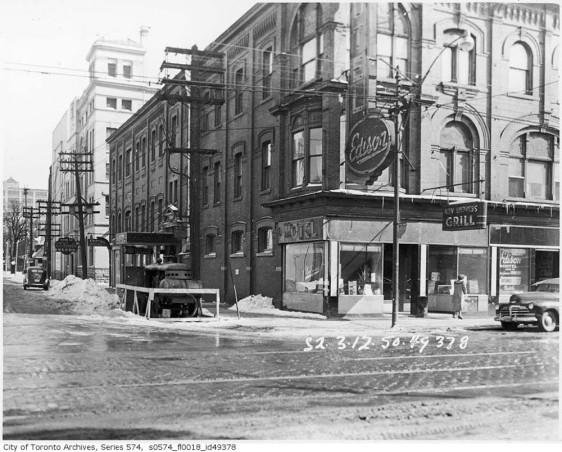While police investigate how the historic former Empress Hotel was set ablaze, Ryerson President Sheldon Levy is busy planning to take over the property and turn it into Ryerson’s gateway. All that’s missing is the cash to do it. Features editor Mariana Ionova reports
For months, most students and passersby paid little attention to the pile of crumbled facade laying on the sidewalk in front of the century-old Empress Hotel. It was only when a six-alarm blaze engulfed the heritage building last week, reducing it to ashes and rubble, that the city took notice once again. But Ryerson President Sheldon Levy had kept an eye on the property and now the charred corner of Yonge and Gould has shot to the top of the university’s wish list.
Ryerson first expressed interest in the deteriorating 122-year-old building after part of it’s exterior crumbled last April. Levy has been clear about his intentions to acquire the property since then.
The building’s opportune location right above the end of the Dundas Station subway platform makes it vitally important to the university, who planned to create a campus subway entrance since 1998 but has lagged in starting the project.
The university’s last bid to move the plan forward was in 2008, when it announced it would connect the subway to the Student Learning Centre (SLC) it planned to build on the former site of Sam the Record Man. However, the high cost of tunnelling under Gould Street forced the university to halt its plans once again late last year.
And, while owning the former Empress Hotel would make a subway entrance possible, the university is not equipped to purchase a multi-million dollar property.
“We don’t have the funds now to say we’re going to purchase this and build on it. This is now looking at $60-70 million and we don’t have that type of money to put towards it,” Levy said.
“Everything is about money in the end. You can have all these great ambitions but there is only a certain amount of money you can put towards it.”
Instead, the best option would be for Ryerson to work with the private sector and the Toronto Transit Commission (TTC) in a collaborative effort that would create both university and commercial space. Also, much like Ryerson’s partnership with Loblaw in the renovation of MLG, a joint effort would take some of the financial pressure off the university.
“I have always been hoping that we would have a partnership between the private sector, the TTC and the university and, therefore, not put the full burden of that cost on the university because I don’t see how we could possibly afford it,” Levy said, adding that the project would also help the TTC reduce some of the rush-hour congestion at its other entrances. A 2008 report by the TTC found Dundas Station to lack sufficient fire exits and proposed a collaboration with Ryerson to correct the problem.
But Ryerson already has several major projects in the works, including the construction of the SLC, the renovation of the School of Image Arts and the restoration of Maple Leaf Gardens. All three ventures have multimillion dollar budgets and are riddled with problems, from the year-long delay of the School of Image Arts to the looming Mar. 31 deadline for the still unfinished MLG.
Despite the university’s determination to undertake the Empress Hotel project, another new property could place an additional financial strain on the university.
Even if the university does generate the funds to purchase the lot, Levy doesn’t have any ideas yet as to what the university would want to do with the property.
“We would have to go through the process of making sure that it is used for the whole city,” he said, adding that the building’s ground level would most likely be used for retail and commercial space.
But Ryerson’s plans come at a time when the property is surrounded by controversy. The Empress Hotel went up in flames when the gas and electricity in the building had been off since April. And police are investigating the possibility of arson.
Although Ryerson was ready to work with the city on heritage preservation, the fire and subsequent demolition of the Empress Hotel has eliminated many of the obstacles associated with the landmark property. A few months ago, new owners would have been required to follow strict regulations when renovating and restructuring the building.
But its demise has cleared the way for new construction and made it much easier for Ryerson to materialize it’s plans.
But Levy maintains that acquiring the property is not opportunistic and sees it as a possibility to positively transform of the corner of Yonge and Gould Streets.
“I don’t see acquiring that property or jointly acquiring that property as anything but a good thing for the university.”
One of the reasons is that Levy sees Gould Street as the entrance to the university and hopes that, by making the property a part of it, he can create some cohesion on an urban campus that is often seen as scattered and fragmented.
“It would be like saying, ‘We are here and this is our space, our campus.’”
The Lalani Group is not accepting media requests at this time and was not available to comment on Ryerson’s interest in the property.
Photo courtesy of Toronto Archives












Leave a Reply